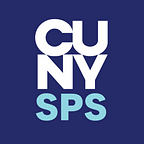CUNY SPS EDI Ambassadors Share Their Thoughts on Inclusivity
In part three of our series, two EDI Ambassadors reflect back on their training and how to be more inclusive at work.
Since its inception in Fall 2019, the Committee on Institutional Equity and Diversity (CIED) has utilized workshops and specialized training sessions to foster a culture of diversity, equity, and inclusion (EDI) at CUNY SPS.
The CIED recently recognized a cohort of faculty and staff who had committed themselves to an intensive EDI training regimen through LinkedIn Learning. Those who completed the multiple training modules were distinguished as “EDI Ambassadors” by the CIED and earned a special certification badge.
We got in touch with the EDI Ambassadors to ask how they planned to apply their newly acquired strategies to advance an inclusive campus culture. In part three of this four-part series, we chatted with EDI Ambassadors Laura Collazo, instructional design/data assistant, Office of Faculty Development and Instructional Technology (OFDIT), and Test Flight facilitator, Office of Academic Affairs; and Dr. Kate Moss, doctoral lecturer, General Education and Liberal Studies, both of whom completed the EDI coursework earlier this year.
What was your favorite takeaway from the series?
Dr. Moss: “I appreciated the focus on ‘ally’ as a verb, and the encouragement to interrupt discussions when something problematic or offensive comes up. Sometimes an incident like this is subtle or unclear, and it can be confusing. I am thinking of a large group meeting once where something was said and everyone was sort of confused and in shock. Later some of us huddled and discussed the interaction privately (even asking ‘Did you also hear what I think I heard? What do we do about this?’). This is understandable, but not the best way to get clarity or address the situation. Now I would aim to interrupt and ask then and there, while everyone is present.”
Laura Collazo: “I really appreciated the presenters’ acknowledging that even as experts, they can still find it hard to have conversations around EDI and won’t always do it perfectly. I can tend to not want to engage in something unless I know I’ll be able to do it without mistakes, so it was helpful to hear this point won’t ever arrive. Between hearing this and being provided with a framework for how to engage with others, I have much more courage and confidence to actively be an ally.”
Did the series inspire any new goals?
Collazo: “Something I considered while going through the trainings is that everything shared was helpful information for interacting with people, in general, not just in the workplace. My goal therefore became more about how I can live out these things in my life as a whole, knowing this will then overflow into interactions I have at work. One of the things I found informative was the discussion around impact vs. intent. This provides a good check for myself if I feel myself getting defensive when someone shares that I’ve said or done something that has hurt or offended, and allows me to be gracious towards others when they’ve done the same. From this place, it’s much easier to more forward with curiosity and engage in productive conversation.”
Dr. Moss: “The series highlighted the importance of leaders seeking out and listening to diverse voices, and this is something I think is very important in general, and certainly in regard to EDI. This is something I aim to do when in a leadership position, and I value it when others in a leadership role do this.”
Have you incorporated any EDI practices you learned into your work or unit at CUNY SPS? If so, how/what?
Collazo: “One specific way I’ve implemented this into my work as a Test Flight facilitator is not shying away from engaging with comments that contain bias in discussion boards. Thankfully, this doesn’t happen very often but when it does, I feel equipped to respond with feedback that will hopefully encourage curiosity.”
The LinkedIn Learning EDI series represents a significant time commitment and everyone has such busy schedules. Would you like to share tips on how you managed your time while working through the LinkedIn Learning series?
Dr. Moss: “I may not have great advice on the last question, as I viewed some of the videos during weekends or faculty annual leave! However, you can watch the videos in increments of five or ten minutes here and there — you don’t have to sit down for an hour each time. The live workshops (such as Safe Zone Training and Mitigating Implicit Bias) and discussions with colleagues were very helpful and time well spent and the timing often worked so you could do it in a lunch break.”
Anything else you would like to add?
Dr. Moss: “There are many kinds of diversity, and as the series highlighted, we all have implicit bias and need to actively work to mitigate this. It’s also important to remember that we don’t always ‘see’ peoples’ various identities. That’s true when we are in a room together and even more so when we are interacting with others online. It’s important to create a space that is open and inclusive to all, to actively seek everyone’s input, and to remember to solicit feedback on how to improve. This is not the kind of work you will ever finish or become the expert in. You just have to keep doing it and continue listening and always trying to learn more and do better.”
Learn more about the CIED’s mission and programs here.
